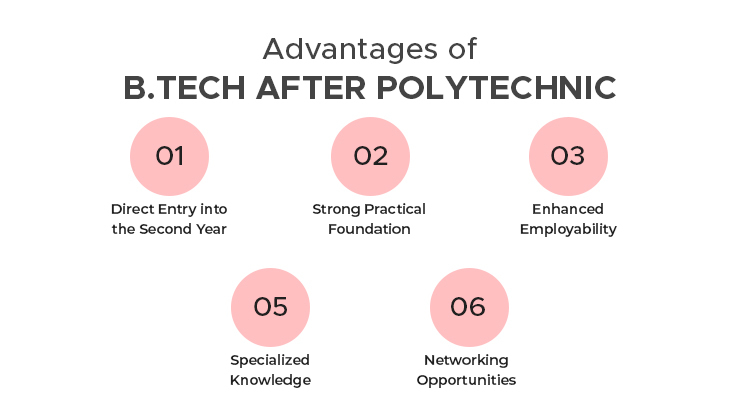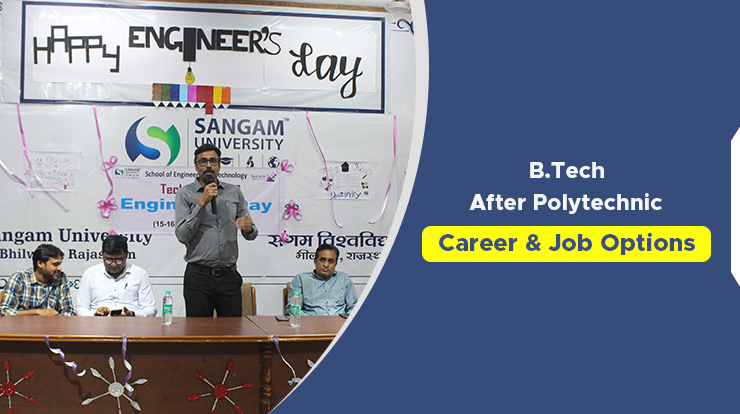Pursuing a B.Tech after completing a polytechnic diploma is a popular and practical choice for many students in India. This path offers numerous benefits, including advanced education, better job prospects, and higher salaries. In this blog, we will explore the advantages of B.Tech after polytechnic, the best career options after polytechnic, potential jobs after polytechnic, and salary expectations.
Advantages of B.Tech After Polytechnic
There are numerous advantages to pursuing a B.Tech after completing a polytechnic diploma:

- Direct Entry into the Second Year: One of the major benefits is that diploma holders can directly enter the second year of the B.Tech program through lateral entry. This saves time and allows you to complete your degree faster.
- Strong Practical Foundation: Polytechnic courses emphasize practical knowledge and hands-on experience. This foundation is beneficial when pursuing a B.Tech, as it complements the theoretical aspects of the degree and helps you excel in your studies.
- Enhanced Employability: Combining the practical skills from a polytechnic diploma with the advanced knowledge of a B.Tech makes you highly employable. Employers value candidates who have both practical experience and theoretical knowledge.
- Specialized Knowledge: Polytechnic courses often focus on specific areas of engineering, such as civil, mechanical, or electrical. Pursuing a B.Tech allows you to deepen your expertise in your chosen specialization, making you a specialist in your field.
- Networking Opportunities: During your B.Tech course, you will have opportunities to interact with industry professionals, attend seminars, and participate in projects. This helps you build a professional network that can be valuable for your career growth.
Best Career Options After Polytechnic
After completing a polytechnic diploma and a B.Tech degree, you have a wide range of career options to choose from. Here are some of the best career paths:
- Civil Engineer: As a civil engineer, you can work on designing, constructing, and maintaining infrastructure projects such as roads, bridges, and buildings. This role is highly in demand, and the salary can range from ₹3,00,000 to ₹6,00,000 per year for fresh graduates.
- Mechanical Engineer: Mechanical engineers are involved in designing, developing, and testing mechanical devices. This field offers diverse opportunities in industries such as automotive, aerospace, and manufacturing. Entry-level salaries typically range from ₹3,50,000 to ₹7,00,000 per year.
- Electrical Engineer: Electrical engineers work on developing and maintaining electrical systems and equipment. This role is crucial in industries such as power generation, electronics, and telecommunications. Starting salaries can range from ₹3,00,000 to ₹6,50,000 per year.
- Software Engineer: With a B.Tech in computer science or a related field, you can pursue a career as a software engineer. This involves designing, coding, and maintaining software applications. The IT industry offers attractive salaries, with entry-level positions ranging from ₹4,00,000 to ₹8,00,000 per year.
- Chemical Engineer: Chemical engineers work in industries such as pharmaceuticals, petrochemicals, and food processing. They are involved in developing and optimizing chemical processes. Fresh graduates can expect salaries ranging from ₹3,50,000 to ₹7,00,000 per year.
- Project Manager: With the experience and knowledge gained from a B.Tech, you can take on roles such as project manager. This involves planning, executing, and overseeing engineering projects. Salaries for project managers can start from ₹5,00,000 per year and go up significantly with experience.
- Quality Assurance Engineer: Quality assurance engineers ensure that products meet quality standards and specifications. They are essential in manufacturing, automotive, and electronics industries. Entry-level salaries can range from ₹3,00,000 to ₹5,50,000 per year.
- Environmental Engineer: Environmental engineers work on projects that help protect the environment, such as waste management and pollution control. This field is growing in importance, and starting salaries range from ₹3,50,000 to ₹6,50,000 per year.
Conclusion
Pursuing a B.Tech after a polytechnic diploma is a smart decision that can significantly enhance your career prospects. The advantages of B.Tech after polytechnic include advanced education, better job opportunities, and higher salaries. There are numerous best career options after polytechnic to choose from, each offering unique opportunities for growth and development.
Whether you choose to enter the workforce directly or continue your education, the skills and knowledge gained from a polytechnic diploma and a B.Tech degree will serve you well in your professional journey.
As one of the top colleges for BTech in Rajasthan, Sangam University is known for providing the best education for your bright future. Invest in your future by exploring the various jobs after polytechnic and salary expectations, and take the next step towards a rewarding career in engineering and technology.
FAQs
Can I join a B.Tech program directly after completing my polytechnic diploma?
Yes, you can join a B.Tech program directly after completing your polytechnic diploma through lateral entry. This allows you to enter the second year of the B.Tech course, saving you time and enabling you to build on the knowledge and skills gained during your diploma.
What are the benefits of pursuing a B.Tech after a polytechnic diploma?
Pursuing a B.Tech after a polytechnic diploma offers several benefits, including advanced knowledge, better job opportunities, higher salary potential, and a pathway to further studies like a Master’s degree. It also provides professional recognition in the engineering field.
What career options are available after completing a B.Tech following a polytechnic diploma?
After completing a B.Tech, you have various career options, such as civil engineering, mechanical engineering, electrical engineering, software engineering, and project management. These roles come with better job prospects and the potential for higher salaries.
How does the salary compare between polytechnic diploma holders and B.Tech graduates?
B.Tech graduates typically earn higher salaries compared to polytechnic diploma holders due to their advanced education and skills. For example, a junior engineer with a diploma might earn around ₹2,50,000 per year, while a B.Tech graduate can expect salaries starting from ₹3,50,000 to ₹7,00,000 per year, depending on the field.


